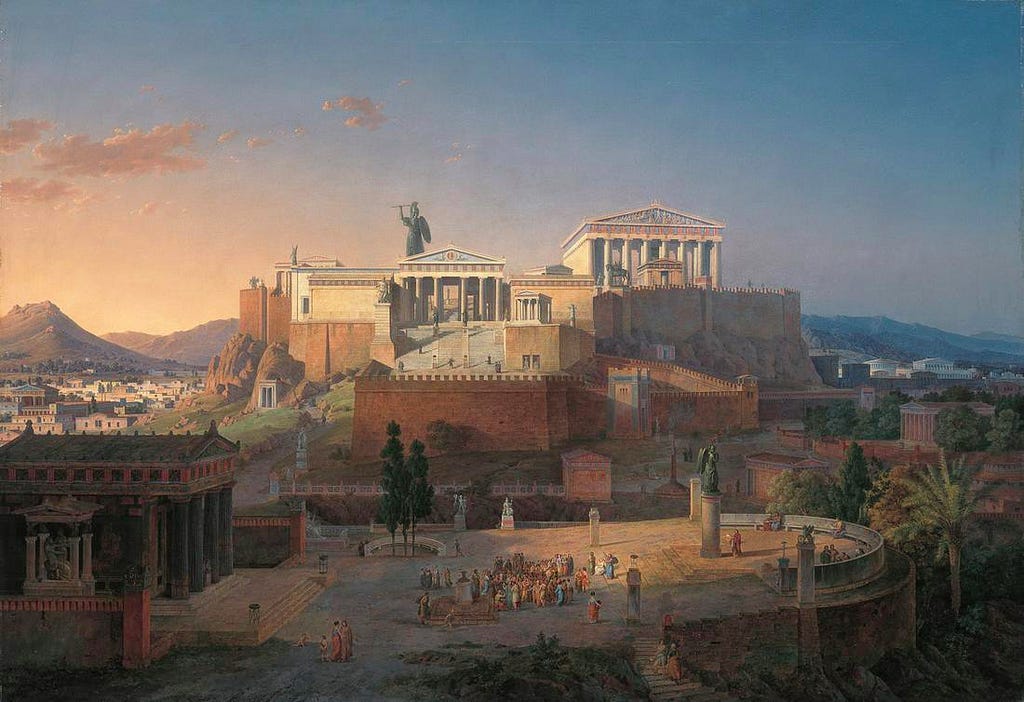Latest news about Bitcoin and all cryptocurrencies. Your daily crypto news habit.
 The original Akropolis
The original Akropolis
Blockchain is the groundbreaking technology. Very soon it will become fully integrated in our daily life like Internet or non-cash payments. Blockchain can potentially be used in any business, but for the general this term is still an unknown concept. Here are the most interesting projects that are already changing the social sphere, healthcare, media, e-commerce, food industry and even state institutions:
Alternative Pension Infrastructure Akropolis.io
The London start-up Akropolis is a blockchain-based pension system. The project offers a solution to the global aging problem, the shortage of pension contributions and the opacity of funds system. Akropolis will keep open all information about deductions and relevant transactions, and allow easily transferring them between funds. If the project is successful, then a person can manage his future pension himself throughout life.
Transparent platform for charity institutions Сherr.io
Cherr.io is a platform for charitable organizations. All transactions are recorded on the blockchain and anyone can see how much money is collected and where they are actually allocated to. Cherr.io also saves the organizational and marketing costs, attracting users to the platform promotion through the internal reward system.
Easy and safe medical data exchange at Aimedis
Many innovations in this area are expected to improve the storage of patient data and create decentralized ecosystems. Those can be used by clinics, insurance funds and patients. For example, Aimedis is a complex solution that allows all participants to safely store and share data. The database stores the medical history, conclusions, research results. Only the patient can provide access to them. The project has an AI that uses machine learning techniques and big data to analyze the patient’s symptoms and meta-data, helping, for example, a person with an atypical disease to find a doctor or even a scientist who has already handled a similar case.
Transparent and honest voting system Agora
The possibilities of blocking technologies use in the voting system are limitless. Think about the anonymity and the opportunity to vote without disclosing political preferences! Each citizen will have his own unique blockchain-based digital ID. This project is closer to real life than it seems — the first blockchain-based presidential elections have already been held in the Republic of Sierra Leone in March on the basis of the Agora platform.
Storiqa — a marketplace without marketing investments
Storiqa startup has already presented itself as a competitor to Amazon. This is a global trading platform for small and medium-sized businesses, where you can pay for goods with cryptocurrency. At the moment about one million stores are registered on the site, focusing directly on the global market, bypassing the standard challenges that arise when opening an online store.
Digital ID for citizens Metadium
Estonia has been using blockchain to manage citizen data and ID for quite a long time — since 2007. A decentralized digital ID has a promising future, as it can not be lost or faked. A missing person with such ID will be much easier to find. Some projects go even further: for example, Metadium offers users a single global meta-ID that bans the use of the data by third parties. The global ID allows you to work in all connected blockchain services and is integrated with the internal payment system.
Quality control for the food industry by TE-FOOD
TE-FOOD technology can keep track of the products from production to the kitchen. It`s a full farm-to-market blockchain solution. The network stores all information about the production, composition, logistics, veterinary control, all vendor checks and sales. The company is focused on the emerging markets, where it promotes greater transparency of the industry, food quality and safety.
Reducing utility costs with Homemine
Today, the most active mining centers are located in the countries with lower rates for electricity, which is mostly generated from non-renewable sources. However, there are projects that change this stance once and forever. For example, a Homemine gadget connects to conventional household appliances and mines cryptocurrency while you are cooking or washing dishes. The tests showed that the average revenue from one such device is about $95 per month — you can completely pay back your utility costs, while no additional energy is spent for mining.
In a few years we may not recognise our everyday life. And thanks to crowd-investment and public sales it our choice what it will be like.
8 Everyday Industries Blockchain Is Changing was originally published in Hacker Noon on Medium, where people are continuing the conversation by highlighting and responding to this story.
Disclaimer
The views and opinions expressed in this article are solely those of the authors and do not reflect the views of Bitcoin Insider. Every investment and trading move involves risk - this is especially true for cryptocurrencies given their volatility. We strongly advise our readers to conduct their own research when making a decision.